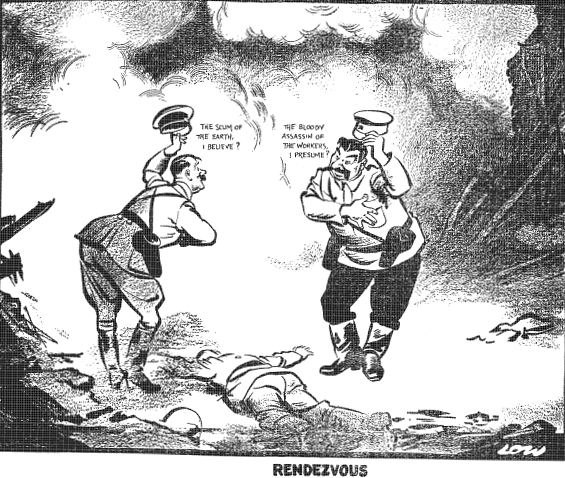They quite often go to war against non-democracies for decidedly ulterior motives, though, don't they? Or support one non-democratic country/army/paramilitary force/bunch of thugs against another. Or impose sanctions against a would-be democracy because the people there want the wrong sort of democracy...
Ulterior motives - that's a matter of opinion
Support of "our tyrants" is a shame, but hey, when push came to shove, that's what people decided they prefer...
Imposing sanctions on the "wrong sort of democracy" is obviously a euphemism for something else (Palestine?) - you'll have to be a bit clearer. How can you have the "wrong sort of democracy"?
EDIT: Forgot to say that these don't disprove what I'm saying.
Nazi Germany and Fascist Italy stood together, the Nazis and the Japanese stood together, the Nazis and the Soviets stood together until Hitler thought he'd have a go, China and North Korea stood together...
Yeah - exactly, what
brilliantly thought out schemes those were:
Likening their war instincts to those of "a very advanced clan of yellow apes," German Chancellor Adolf Hitler praised the government and military of Japan.
"I salute you, chinky-dinky rat men, who have been given life by the confused hand of some long-dead pagan deity," he said. "When Germany stands victorious on a conquered Earth, and Aryan supermen wipe out the undesirable mud races one by one, your like will surely survive to be among the last to be exterminated."
Then Germany invaded the USSR and killed millions! What an alliance!
And Fascist Italy lent whatever way they thought was best - towards Germandy when they looked like winning, and towards the Allies when they looked like winning.
Basically all of these alliances were simply marriages of convenience. Tyrannies will never truly stand together (Iraq, anyone?), because they cannot trust one another (as your examples clearly show). They are (as Humphrys has noted) like thugs doing deals with one another, only to turn and put the knife in as soon as it becomes advantageous.
They treat them pretty fucking badly sometimes. How many Americans are in jail for relatively minor drug offences? How many people in this country are in jail that ought to be receiving psychiatric treatment?
Ok, so the "war on drugs" (Bill: "it's not a war on drugs, it's a war on personal freedom") is pretty much the
last example of the state acting against the people. I don't like it, but there it is.
And in any case, implicit in the statement is the sentiment that it's perfectly OK to wage war on people, as long as you don't classify them as citizens, or re-define war as 'security operations', c.f. rocketing houses full of kids and old women in the Left Bank, etc....
Er, no - no it fucking isn't, and thanks for crediting me with attempting to use semantics to justify murder.
After all of the arguments we've had about Palestine, I expect you know exactly what I'm going to say in response to this, so I'll just ask you one related question (it's open to anyone, actually, and it's very important):
What would a non-democracy do?
(Answers
here,
here and
here, as well as numerous other places...)
This is generally true, but it takes a lot more than adequate bread/rice supplies to make a functional country. Cuba has free universal health care, while millions in America can't afford even basic health insurance, for example.
You're just dodging the real issue. It's not "generally true" it's absolutely fucking true. It's so true Sen recieved the Nobel Peace Prize just for pointing it out. There's no comparison to be made between different types of health care and a political system that allows (and even encourages) the starvation of
millions to take place.

